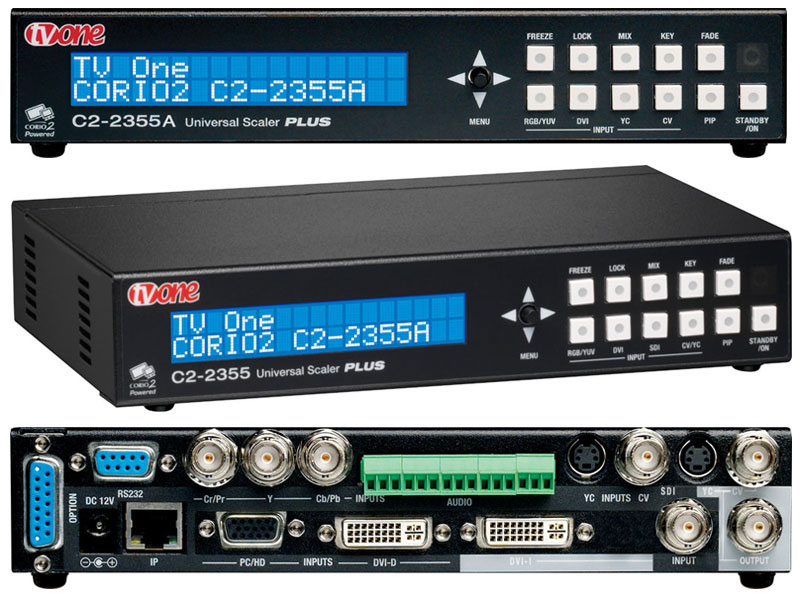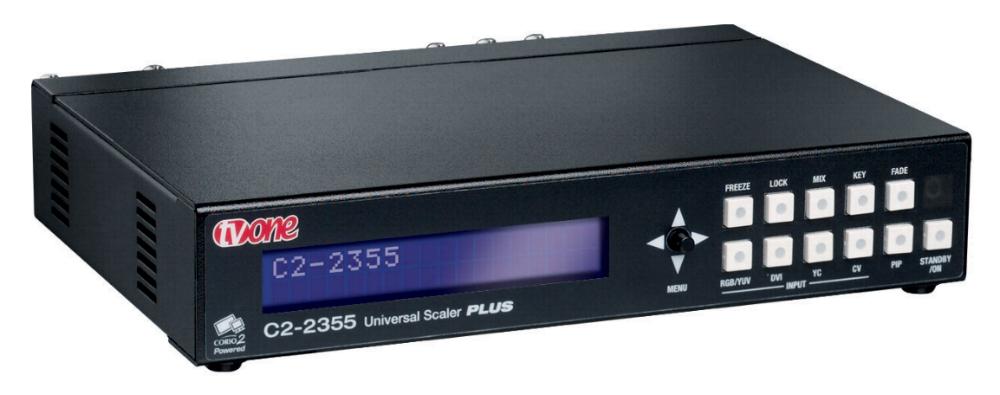My Cart
- Home
- Connect to the PC/Laptop
- Video
- TVOne C2-2355A Universal Video Switcher/Scaler
- description
Key Features of the C2-2355A
- Up-Down-Cross Conversion
- Digital Inputs: SD/HD-SDI, DVI-D
- Analog Inputs: YUV/YPbPr, RGB/YPbPr , CV, YC
- Digital Outputs: SD/HD-SDI, DVI-I
- Analog Outputs: DVI-I (RGB/YPbPr/YUV), CV, YC
- Analog: PC to 2048x2048, HDTV to 1080p/60
- DVI: PC to 1920x1200, HDTV to 1080p/60
- Supports: NTSC, PAL, PAL-M, PAL-N, SECAM
- Motion Compensation & 3:2 Pulldown
- Temporal Interpolation & Diagonal Interpolation
- Automatic Incoming Resolution Detection
- AutoSet - Automatic picture sizing of PC inputs
- 4:4:4 Full bandwidth Chroma Sampling
- Video signal parameter adjustments
- Integral 4x1 Stereo Audio Routing Switcher
- RS-232 and IP Interface & Windows Control Panel
- Variable Image Zoom to 10X and Shrink to 10%
- Genlock With Subcarrier Phase Adjustment
- PIP, Chromakey and Lumakey, Edge Blending
- Optional Single/Dual Rackmount Kit
- Optional Input Expansion with S2 Switchers
C2-2355A HD Up-Down-Cross Converter is based on TV One's exclusive CORIO®2 technology and provides high quality bi-directional conversion between a variety of analog and digital video formats. Input and Outputs can be SD/HD-SDI, DVI, Composite Video, YC, YUV, YPbPr or RGB. Signal parameters of the incoming video may be adjusted. All settings are stored in non-volatile memory and are retained even when power is switched off. Ten user defined presets are also available to customize settings for various applications. The high resolution RGB/YPbPr output is selectable as virtually any PC or HDTV resolution. Our exclusive AutoSet feature takes the hassle out of setup by automatically sizing and positioning the computer image to fit exactly on the video screen. NTSC, PAL, PAL-M, PAL-N, SECAM standards are supported.
All the functions can be controlled via the front panel Push Buttons, an Infrared Remote Control Unit, an RS-232 or IP connection. Windows Control Panel software is provided and most third party control systems interface directly with the entire C2 range of products. A front panel LCD makes setup easy. The unit is housed in a desktop case and an optional rackmount kit is available that holds one or two units.
Variable Zoom to 10X enlarges any part of the computer screen to fill the entire video screen and position controls allow movement to any area desired. Variable Shrink to as little as 10% allows fitting the image onto most displays. The advanced Digital Flicker Elimination circuitry and high sampling rate insures crisp, clear images, while full bandwidth chroma sampling insures faithfully reproduced, high resolution colors. Motion compensation, diagonal interpolation and a 3:2 Pulldown feature for NTSC greatly improve the image quality. Temporal interpolation greatly improves frame-rate conversion by analyzing and merging successive frames. Pixel Level Motion Adaptive Diagonal Interpolation insures high quality de-interlacing of PAL and NTSC signals.
Advanced Features The Key Mode allows computer graphics to be keyed over an external Composite or YC signal. The keyed image may be faded in and out. Due to the 4:4:4 sampling format, precise keying at the pixel level can be achieved. The Mix Mode permits Seamless Cut, Fade or Wipe transitions between input sources. The PIP Mode allows either of the computer inputs to be inset in a window over either of the video inputs or vice versa. The PIP window may be placed anywhere on the screen. The Edge Blending feature allows feathering any or all of the edges; multiple images can be aligned vertically, horizontally, or both to create unusual displays. Using multiple units, any number of images can be blended. The Genlock feature insures precise synchronization of the incoming signals by providing a wide Subcarrier lock range with Subcarrier phase adjust.
Input Expansion is possible by using the optional S2 Series Input Expansion Modules for SD/HD-SDI, DVI, RGB, YPbPr, YUV, Composite or YC. These units link to C2-2355A unit via an OPTIONS Interconnect Cable and become an integral part of the main unit from a control and operational standpoint. The routing of these additional inputs is controlled directly from the control system of the C2-2355A. Multiple different S2 models may be simultaneously connected to a single C2 unit.
Basic Integral Stereo Audio switching is provided by an integral 4x1 audio routing switcher. The four impedance-independent unbalanced inputs follow the video input selection. A rear panel terminal block provides access.
Advanced Stereo Audio is available via the optional S2-106AD Input Expansion Switcher, providing six differential audio inputs, which can be used for low impedance balanced or high impedance unbalanced sources. The user controls audio level, audio sampling frequencies and up to 999ms of adjustable audio delay independently for each input. The unit has numerous choices for audio I/O connectors, including a terminal block. The S2-106AD connects to the C2-2355A via the OPTIONS interconnect cable and is then fully integrated into the control system of the host unit.









